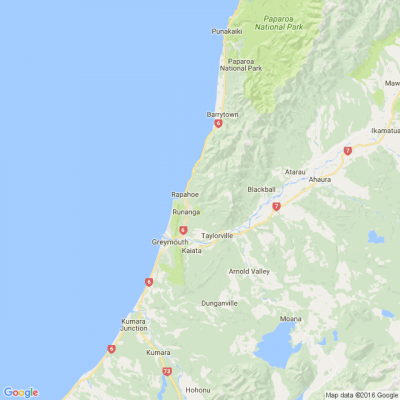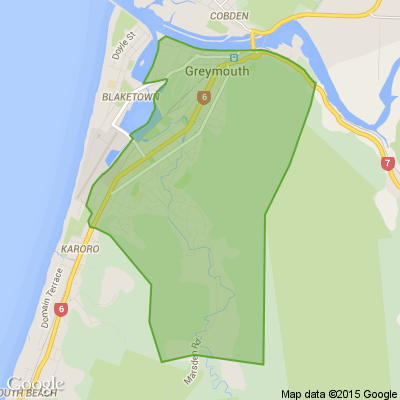Hokitika protection needed ‘with haste’
From local democracy reporter Brendon McMahon:
Bolstering the Hokitika River floodwalls skirting the town near Westland Milk Products should proceed "with haste" and be prioritised over sea protection, a West Coast Regional councillor says.
Westland ward councillor and deputy chairman Peter Haddock said addressing the shift in the main channel to the true right, with a real risk of it cutting in to the bank in the vicinity of Westland Milk Products (WMP), was a priority for the council.
The council wants it addressed "with haste," he said.
The threat of the river to the West Coast economy, and the low lying residential areas in Hokitika, could not be underestimated, he said.
"There's been discussions taking place between council and WMP and other affected parties to get some emergency repairs undertaken there," Haddock said.
This included more rock work on the bank at the Westland District Council stormwater outfall point, just behind the factory at the end of Town Belt East, almost immediately.
Haddock said council's infrastructure projects leader Scott Hoare had been instructed "to proceed with haste".
It came after a joint meeting of the Hokitika rating district just prior to the October elections.
Former Westland mayor Bruce Smith warned of the danger of litigation if the river bank issue was not taken more urgently by the regional council.
Hoare said things were "progressing" but he would not be drawn on how quickly.
"We're working through that project," he said.
The previous design and concept work to improve the stopbank from Kaniere down to the Hokitika River Bridge had been reviewed in terms of how it would work.
"We've got some changes downstream of the milk factory to the bridge."
Hoare said this was to better understand "the risks". He noted every West Coast river posed "a risk" but he acknowledged particular risk at Hokitika. "We have no immediate concerns but it is still a risk."
Haddock said council had already been allocated `shovel ready' money by the Government department Kanoa to address sea protection in Hokitika, but was asking for a review of that.
"Council is talking to them about whether the river works are more pressing due to the immediate threats to Westland dairy and the lower part of Hokitika.
"It may be that there is emergency works done quickly, but there is a lot of planning needed... It has been given the highest priority."
Haddock said at the same time, the council now had a fresh opportunity to apply for new infrastructure funding via Kanoa for further projects and it was "actively pursuing' those.
More rock work on the bank at the Westland District Council stormwater outfall point, just behind the factory at the end of Town Belt East, was due to be done almost immediately.
The economic implications for the whole region of the Hokitika River breaking through and inundating the dairy factory and the residential area should not be underrated, he said.
"We've really got to put a good business case there. The dairy company is so important... it would be an environmental disaster.
"It is quite vulnerable... the main thing is to secure the funding; because without the funding the ratepayers can't afford it."
*Public interest journalism funded through NZ On Air
Time to Tickle Your Thinker 🧠
If a zookeeper had 100 pairs of animals in her zoo, and two pairs of babies are born for each one of the original animals, then (sadly) 23 animals don’t survive, how many animals do you have left in total?
Do you think you know the answer? Simply 'Like' this post and we'll post the answer in the comments below at 2pm on the day!
Want to stop seeing these in your newsfeed? No worries! Simply head here and click once on the Following button.

Poll: As a customer, what do you think about automation?
The Press investigates the growing reliance on your unpaid labour.
Automation (or the “unpaid shift”) is often described as efficient ... but it tends to benefit employers more than consumers.
We want to know: What do you think about automation?
Are you for, or against?

-
9.5% For. Self-service is less frustrating and convenient.
-
43.4% I want to be able to choose.
-
47.1% Against. I want to deal with people.
Have you got New Zealand's best shed? Show us and win!
Once again, Resene and NZ Gardener are on the hunt for New Zealand’s best shed! Send in the photos and the stories behind your man caves, she sheds, clever upcycled spaces, potty potting sheds and colourful chicken coops. The Resene Shed of the Year 2026 winner receives $1000 Resene ColorShop voucher, a $908 large Vegepod Starter Pack and a one-year subscription to NZ Gardener. To enter, tell us in writing (no more than 500 words) why your garden shed is New Zealand’s best, and send up to five high-quality photos by email to mailbox@nzgardener.co.nz. Entries close February 23, 2026.







 Loading…
Loading…